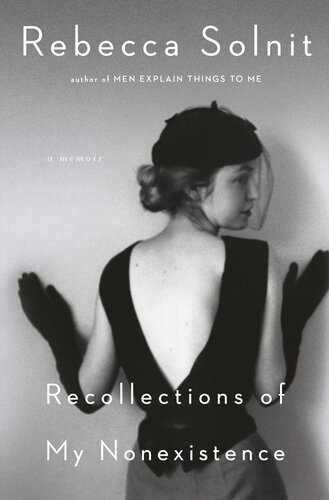
Recollections of My Nonexistence
A Memoir
- اطلاعات
- نقد و بررسی
- دیدگاه کاربران
نقد و بررسی

October 1, 2019
Winner of the National Book Critics Circle Award for River of Shadows and long-listed for National Book Award honors for Call Them by Their True Names, activist/essayist Solnit shows how 1980s San Francisco made her a writer and a feminist. Among the forces influencing her: moving into a tiny apartment at age 19, discovering punk rock, resisting an epidemic of street violence against women, learning about the importance of joy and belonging from gay men, and embracing the beauty and deep-rooted conflicts of the American West.
Copyright 2019 Library Journal, LLC Used with permission.

October 14, 2019
Author and activist Solnit (Whose Story Is This?) writes in this enlightening, nonlinear memoir of her life as a poor young woman in 1980s San Francisco and her development as a writer and feminist thinker. As a teen, Solnit fled a volatile home life to forge her path. She rented an apartment in a black neighborhood (“I was the first white person to live in the building in seventeen years”) and acquired a writing desk from a friend who was nearly murdered by an ex (“Someone tried to silence her. Then she gave me a platform for my voice”). While in graduate school, she worked at a museum—which informed the writing of her first book, Secret Exhibition—and struggled to be heard in a world that favored male writers. In fluid, vivid prose, she recalls the terror she experienced while walking the streets alone, not knowing if she’d be attacked or raped, and considers how negative representations of women in art affect creative output (“How do you make art when the art that’s all around you keeps telling you to shut up and wash the dishes?”). Along the way, she highlights her publishing achievements, including the viral essay “Men Explain Things to Me,” which inspired the term mansplaining. This is a thinking person’s book about writing, female identity, and freedom by a powerful and motivating voice for change.

Starred review from December 1, 2019
A feminist, activist, and prolific writer recounts her emergence from solitude and vulnerability. "To have a voice," writes Solnit (Whose Story Is This?: Old Conflicts, New Chapters, 2019, etc.) in her absorbing new memoir, "means not just the animal capacity to utter sounds but the ability to participate fully in the conversations that shape your society, your relations to others, and your own life." As a young woman in San Francisco in the 1980s, Solnit lacked the "three key things that matter in having a voice: audibility, credibility, and consequence." Instead, she felt silenced by a society that effaced women, circumscribed their freedom through harassment and violence, and insisted that they learn "deferential limits." So she became expert "at the art of nonexistence, since existence was so perilous." At 19, "young, ignorant, poor, and almost friendless," Solnit was finishing her last semester at San Francisco State University, living in a dingy residential hotel, when she found an affordable, light-filled studio apartment. Furnished with pieces she found on the street or in thrift stores, the tiny apartment, where she lived for the next 25 years, became a refuge from a pervasive threat of violence. A joyous walker, she was often "followed and yelled at and mugged and grabbed." In the news, movies, and TV, women were beaten, raped, and murdered by boyfriends, husbands, or serial killers: "Even if none of these terrible things happen to you," writes the author, "the possibility they might and the constant reminders have an impact." Books offered another kind of refuge where "I ceased to be myself, and this nonexistence I pursued and devoured like a drug." Solnit traces her discovery of communities--artists, punk musicians, gay men and women--that sustained her and the people and places that inspired many of her books. Writing offered her a way of participating in the world, probing "what's hidden beneath the assumptions or conventions," illuminating forgotten people and places, and showing "how invisibility permits atrocity." A perceptive, radiant portrait of a writer of indelible consequence.
COPYRIGHT(2019) Kirkus Reviews, ALL RIGHTS RESERVED.

Starred review from January 1, 2020
An inquisitive, perceptive, and original thinker and enthralling writer with more than 20 salient books to her name, Solnit has created an unconventional and galvanizing memoir-in-essays that shares key, often terrifying, formative moments in her valiant writing life. Already living on her own at 19, Solnit moved into a light-filled apartment in San Francisco in the early 1980s and lived and wrote there for a quarter of a century, learning invaluable lessons in self and community from her African American and gay neighbors and watching the city change. Solnit muses on her love of reading and wandering and recounts how she found her way to writing nonfiction that evokes life both factual and felt. She also illuminates with piercing lyricism the body-and-soul dangers women face in our complexly, violently misogynist world. Her own encounters with sexual aggression taught her the art of nonexistence, since existence was so perilous, yet Solnit has sent herself on intrepid journeys in pursuit of understanding the contradictions of existence. An activist as well as a writer steeped in history, landscapes, and art, Solnit has become a feminist hero for her critiques of sexist acts great and small, while remaining dedicated to change and hope. This is an incandescent addition to the literature of dissent and creativity.(Reprinted with permission of Booklist, copyright 2020, American Library Association.)




دیدگاه کاربران